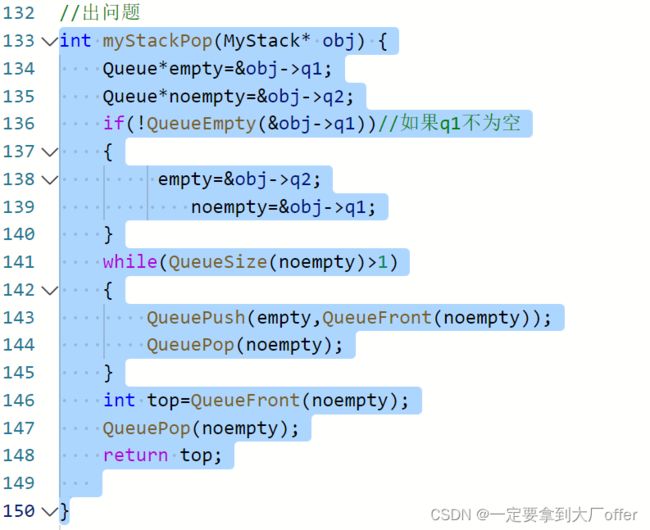数据结构栈和队列OJ题
225. 用队列实现栈 - 力扣(LeetCode)
#define DataType int
#include
typedef struct QueueNode
{
struct QueueNode*next;
DataType data;
}QueueNode;
typedef struct Queue
{
QueueNode *head;
QueueNode *tail;
}Queue;
void QueueInit(Queue* pq);
//销毁,挨个遍历销毁。注意两个指针最后别为野了
void QueueDestroy(Queue* pq);
//尾插,别忘了插入的时候不仅tail的next要指向新节点,tail还要指向新节点
void QueuePush(Queue* pq, DataType x);
//注意断言为空,注意当头指针为空的时候那时候就是空了,还要置尾指针为空,否则尾指针会是野指针
void QueuePop(Queue* pq );
//判断是否为空,直接返回pq->head==0;即可
bool QueueEmpty(Queue* pq);
//这两个取元素注意断言为空
DataType QueueFront(Queue* pq);
DataType QueueBack(Queue* pq);
int QueueSize(Queue* pq);
void QueueInit(Queue *pq)
{ assert(pq);
pq->head=pq->tail=NULL;
}
bool QueueEmpty(Queue*pq)
{ assert(pq);
return pq->head==NULL;
}
void QueuePush(Queue *pq,DataType x)
{
QueueNode *newnode=(QueueNode*)malloc(sizeof(QueueNode));
newnode->data=x;
newnode->next=NULL;
if(pq->head==NULL)
{
pq->head=pq->tail=newnode;
}
else
{
pq->tail->next=newnode;
pq->tail=newnode;
}
}
DataType QueueBack(Queue*pq)
{ assert(pq);
assert(pq->tail);
return pq->tail->data;
}
int QueueSize(Queue*pq)
{
int size=0;
QueueNode *cur=pq->head;
while(cur)
{
cur=cur->next;
size++;
}
return size;
}
//
void QueuePop(Queue *pq)
{
assert(!QueueEmpty(pq));
QueueNode*temp=pq->head;
pq->head=pq->head->next;
free(temp);
if(pq->head==NULL)
pq->tail=NULL;
}
DataType QueueFront(Queue* pq)
{ assert(pq);
assert(!QueueEmpty(pq));
return (pq->head)->data;
}
void QueueDestroy(Queue *pq)
{
QueueNode*cur=pq->head;
while(cur)
{
QueueNode*temp=cur;
cur=cur->next;
free(temp);
temp=NULL;
}
pq->tail=pq->head=NULL;
}
typedef struct {
Queue q1;
Queue q2;
} MyStack;
MyStack* myStackCreate() {
MyStack *pst=(MyStack*)malloc(sizeof(MyStack));
QueueInit(&pst->q1);
QueueInit(&pst->q2);
return pst;
}
void myStackPush(MyStack* obj, int x) {
if(!QueueEmpty(&obj->q1))//哪个不为空往哪里插入
{
QueuePush(&obj->q1,x);
}
else
{
QueuePush(&obj->q2,x);
}
}
//出问题
int myStackPop(MyStack* obj) {
assert(obj);
Queue* emptyQ = &obj->q1;//假设q1为空,q2不为空
Queue* nonEmptyQ = &obj->q2;
if (!QueueEmpty(&obj->q1))
{
emptyQ = &obj->q2;
nonEmptyQ = &obj->q1;
}
while (QueueSize(nonEmptyQ) > 1)
{
QueuePush(emptyQ, QueueFront(nonEmptyQ));
QueuePop(nonEmptyQ);
}
int top = QueueFront(nonEmptyQ);
QueuePop(nonEmptyQ);//记得pop掉
return top;
// Queue*empty=&obj->q1;
// Queue*noempty=&obj->q2;
// if(!QueueEmpty(&obj->q1))
// {
// empty=&obj->q2;
// noempty=&obj->q1;
// }
// while(QueueSize(noempty)>1)
// {
// QueuePush(empty,QueueFront(noempty));
// QueuePop(noempty);
// }
// int top=QueueFront(noempty);
// QueuePop(noempty);
// return top;
}
int myStackTop(MyStack* obj) {
if(!QueueEmpty(&obj->q1))
{//q1不空
return QueueBack(&obj->q1);
}
else
{//q2不空
return QueueBack(&obj->q2);
}
}
bool myStackEmpty(MyStack* obj) {
return QueueEmpty(&obj->q1)&&QueueEmpty(&obj->q2);
}
void myStackFree(MyStack* obj) {
QueueDestroy(&obj->q1);
QueueDestroy(&obj->q2);
free(obj);
obj=NULL;
} 这道题写出来个Bug找了一个多小时,就是判断队列为空的时候
return 了 pq->head==NULL;就因为少写一个==
还有这个
这种假设思想学一下。先假设一个为空另一个不为空
如果(if)不满足的话调一下。
622. 设计循环队列 - 力扣(LeetCode)
typedef struct {
int *arr;
int tail;
int front;
int k;
} MyCircularQueue;
bool myCircularQueueIsEmpty(MyCircularQueue* obj);
bool myCircularQueueIsFull(MyCircularQueue* obj);
MyCircularQueue* myCircularQueueCreate(int k) {
MyCircularQueue*cq=(MyCircularQueue*)malloc(sizeof(MyCircularQueue));
cq->arr=(int *)malloc(sizeof(int)*(k+1));
cq->tail=0;
cq->front=0;
cq->k=k;
return cq;
}
bool myCircularQueueEnQueue(MyCircularQueue* obj, int value) {
if(myCircularQueueIsFull(obj))
return false;
obj->arr[obj->tail]=value;
obj->tail=(obj->tail+1)%(obj->k+1);
return true;
}
bool myCircularQueueDeQueue(MyCircularQueue* obj) {
if(myCircularQueueIsEmpty(obj))
return false;
obj->front=(obj->front+1)%(obj->k+1);
return true;
}
int myCircularQueueFront(MyCircularQueue* obj) {
if(myCircularQueueIsEmpty(obj))
return -1;
return obj->arr[obj->front];
}
int myCircularQueueRear(MyCircularQueue* obj) {
if(myCircularQueueIsEmpty(obj))
return -1;
return obj->arr[(obj->tail-1+obj->k+1)%(obj->k+1)];
}
bool myCircularQueueIsEmpty(MyCircularQueue* obj) {
if(obj->front==obj->tail)
return true;
else
return false;
}
bool myCircularQueueIsFull(MyCircularQueue* obj) {
return (obj->tail+1)%(obj->k+1)==obj->front;
}
void myCircularQueueFree(MyCircularQueue* obj) {
free(obj->arr);
free(obj);
}232. 用栈实现队列 - 力扣(LeetCode)
#define _CRT_SECURE_NO_WARNINGS 1
#include
#include
#include
#include
#include
#define DataType int
typedef struct Stack
{
DataType* arr;
int top;
int capacity;
}ST;
void StackInit(ST* ps);
void StackDestroy(ST* ps);
void StackPush(ST* ps, DataType x);
void StackPop(ST* ps);
DataType StackTop(ST* ps);
int StackSize(ST* ps);
bool StackEmpty(ST* ps);
void StackInit(ST* ps)
{
assert(ps);
ps->arr = NULL;
ps->capacity = ps->top = 0;
}
void StackDestroy(ST* ps)
{
assert(ps);
free(ps->arr);
ps->arr = NULL;
ps->capacity = ps->top = 0;
}
void StackPush(ST* ps, DataType x)
{
if (ps->top == ps->capacity)
{
int newcapacity = ps->capacity == 0 ? 4 : ps->capacity * 2;
DataType* temp = (DataType*)realloc(ps->arr,sizeof(DataType) * newcapacity);
//realloc返回的是新开辟的头地址
if (temp == NULL)
{
printf("realloc fail\n");
exit(-1);
}
ps->capacity = newcapacity;
ps->arr = temp;
}
ps->arr[ps->top++] = x;
}
void StackPop(ST* ps)
{
assert(ps);
assert(ps->top>0);
ps->top--;
}
DataType StackTop(ST* ps)
{
assert(ps);
assert(ps->top >0);
//等于0表示已经为空了
return ps->arr[ps->top - 1];
}
int StackSize(ST* ps)
{
assert(ps);
return ps->top;
}
bool StackEmpty(ST* ps)
{
assert(ps);
if (ps->top == 0)
return true;
else
return false;
//或者
/*return ps->top == 0;*/
// ==返回的是true 和false
}
typedef struct {
ST popST;
ST pushST;
} MyQueue;
MyQueue* myQueueCreate() {
MyQueue*q=(MyQueue*)malloc(sizeof(MyQueue));
StackInit(&q->popST);
StackInit(&q->pushST);
return q;
}
void myQueuePush(MyQueue* obj, int x) {
StackPush(&obj->pushST,x);
}
int myQueuePop(MyQueue* obj) {
if(StackEmpty(&obj->popST))
{
while(!StackEmpty(&obj->pushST))
{
StackPush(&obj->popST,StackTop(&obj->pushST));
StackPop(&obj->pushST);
}
}
int top=StackTop(&obj->popST);
StackPop(&obj->popST);
return top;
}
int myQueuePeek(MyQueue* obj) {
if(StackEmpty(&obj->popST))
{
while(!StackEmpty(&obj->pushST))
{
StackPush(&obj->popST,StackTop(&obj->pushST));
StackPop(&obj->pushST);
}
}
return StackTop(&obj->popST);
}
bool myQueueEmpty(MyQueue* obj) {
return StackEmpty(&obj->pushST)&&StackEmpty(&obj->popST);
}
void myQueueFree(MyQueue* obj) {
StackDestroy(&obj->popST);
StackDestroy(&obj->pushST);
free(obj);
}
